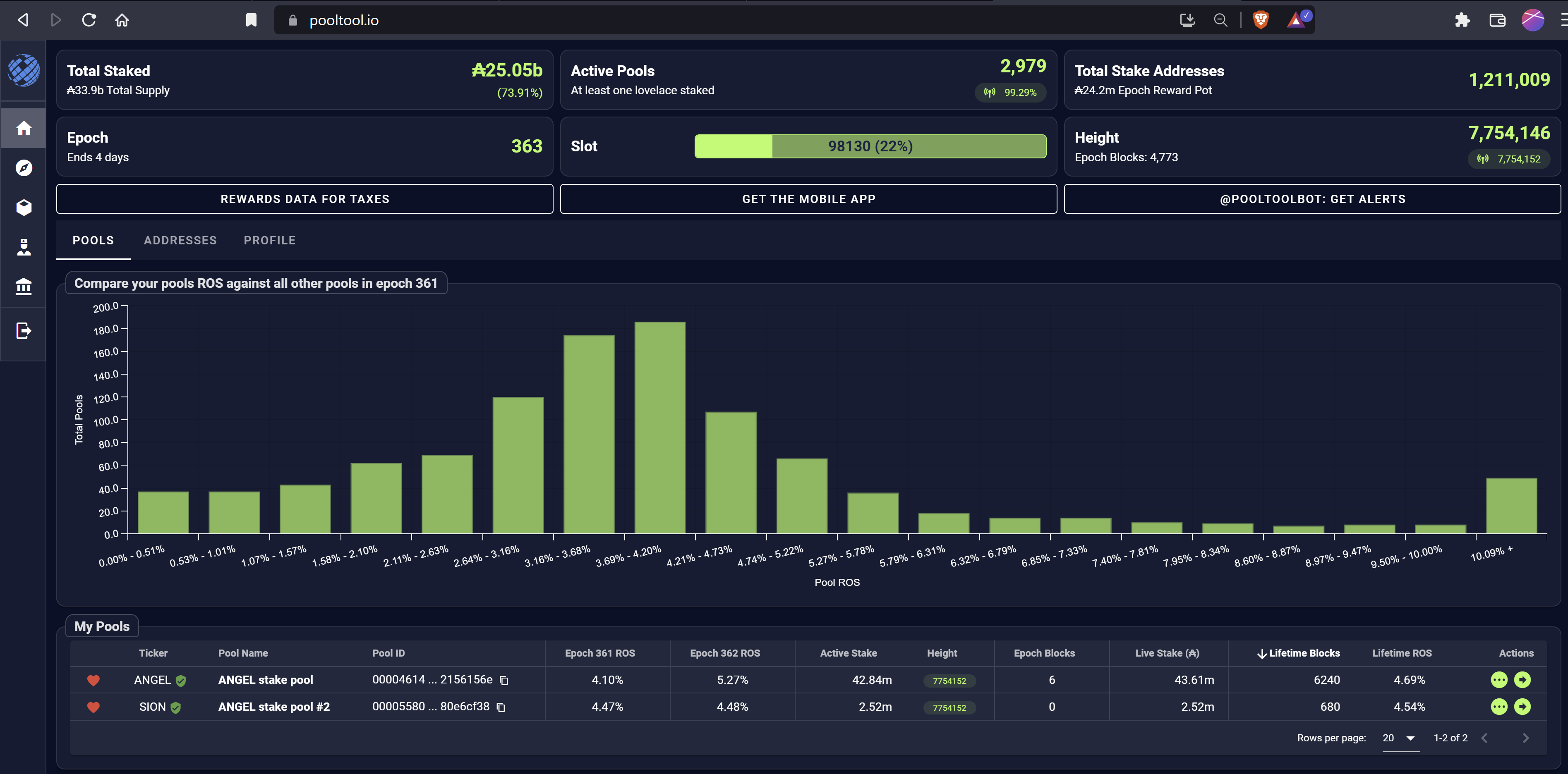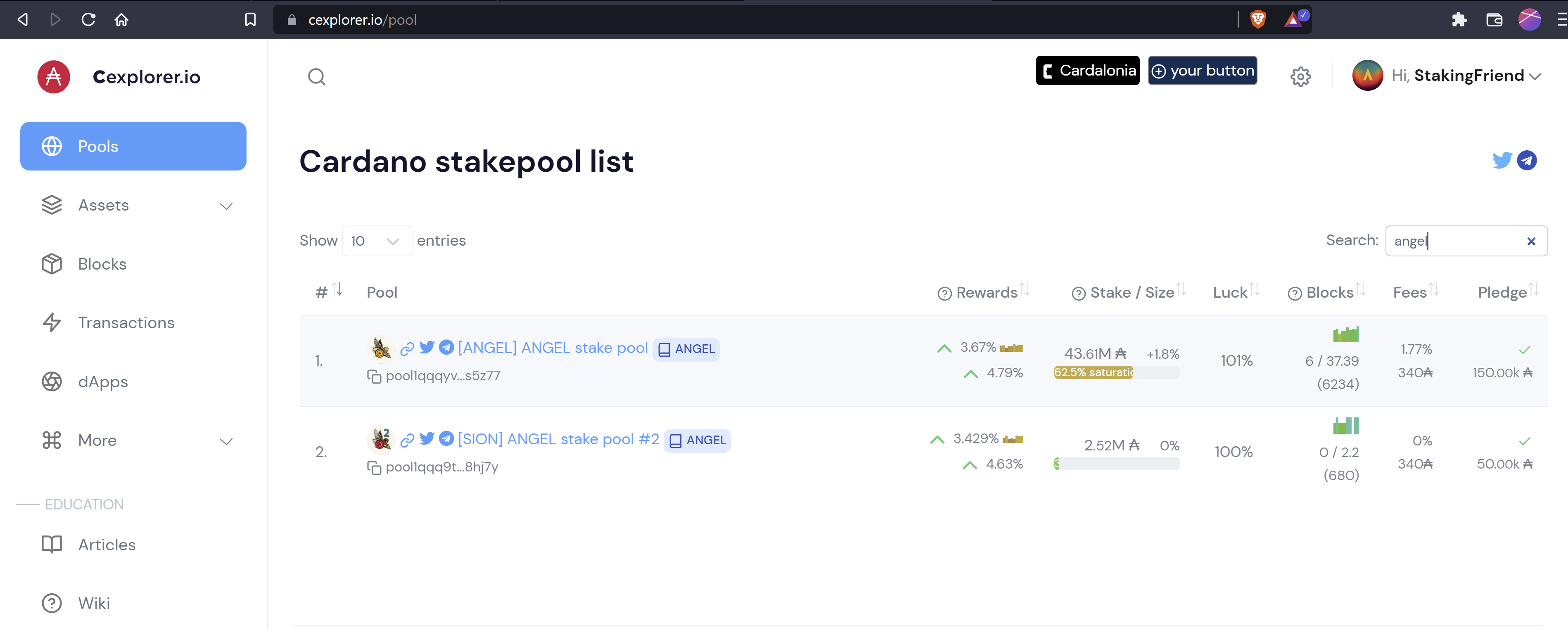
The main goal of our pools is to support the Cardano community, ecosystem and decentralization.
We are offering a low staking fee, while providing an excellent performance and personalized support. We have experience running our pools since the Incentivised testnet (ITN) and we also support our testnet since its creation
The delegation of your ADA to our Cardano pools DOES NOT require you to send us your ADA;
the delegation is a totally different operation and can be done in the following wallets:
-
Daedalus is a full-node wallet which means that it downloads,
stores and validates a full copy of the blockchain. It can operate in a trustless manner and it does not rely on
centrally hosted servers.
-
Yoroi is a light wallet, which means it does not download the full copy of the blockchain. It connects to
trusted servers which have the full copy of the blockchain. It has versions for Android and IOS, as well as browser extensions.
-
ETERNL is a light wallet. It was developed by members of the SPO community, by Marcel and Ola. At the moment, it is my goto wallet and I strongly recommend it.
It offers an excellent functionality, super stable and fast syncing in most conditions, full support for hardware wallets (ledger and Trezor), full support for NFTs with an attractive graphic interface, possibility to send all tokens as well as support for tokens fragmentation, support for catalyst voting, can be installed as a browser extension and also support mobile devices, supports smart contracts (dApps), shows full reward history (graphics and values), accurate ratings for pools, intuitive reward withdrawal functionality, transactions are listed in a very intuitive manner, allows for adding messages during send, support single address mode (nami & cli), also quite easy to unregister a wallet.
-
Nami is a light wallet created by Alessandro, operator of Berry pool and also creator of NFT project spacebudz.
It allows to interact with smart contracts (dApps) and supports hardware wallets, although its delegation functionality is somewhat limited (only allows delegating to BERRY pool, unless we use the JOIN functionality provided by pool.pm, in which case we can select any pool, but this process does not appear to be very intuitive).
The delegation/reward cycle is the following:

Once you delegate, you will have to wait between 15 and 20 days to get first rewards from chosen pool, provided the pool has signed blocks. After that, you would get rewards every 5 days.
Delegation A, in the diagram, would take 18 days from delegation to rewards.
The following websites list available pools in Cardano and provide a live comparison in terms of several factors such as live stake, epoch fee,
variable fee, pool pledge, lifetime blocks, etc.
PoolTool is an excellent website that has been developed by PapaCarp (from Love pool). It basically offers anything that a pool operator or
delegator might need.
The information when you click on a single pool is very extensive. It basically list all the relevant metric epoch by epoch,
with a supporting graphic interface. It also shows the history of blocks and list of delegators. For delegators, it shows the rewards history epoch by epoch, as well as the equivalent value in different currencies (USD, BTC, EUR, etc)
It has available a telegram bot (https://t.me/PoolToolBot) that allows operators and delegators to follow certain pools and be notificed in real time of changes of stakes, minted blocks, pool fees, etc.
CExplorer.io (former adapools) is another excellent website for pools monitoring which boasts of an impressive graphic interface. It can be used by both pool operators as well as delegators. It allows to sort out pools according to different parameters such as share/stake, 30 day ROA, BPE, fees, Pledge, etc.
CExplorer.io has implemented their own smart ranking calculation that takes a large number of parameters into account (ROS across several epochs, number of delegators and their stake variance, difference between active & live stake, etc). This ranking is used by Yoroi app.
It also has available a telegram bot (https://t.me/cexplorer_bot) to notify anyone subscribed, in real time, every time a pool(s) mints a block, changes in delegation, relays offline, etc. It also has other features such as a delegation newsletter.
Similar to pooltool, when you click on a single pool you get a list all the relevant metric epoch by epoch.
Other tools that can be used to monitor pool stats are
Cardanoscan.io
and
Pegasus Tool for smartphones
You can download and install Daedalus
, Yoroi or Eternl . We strongly recommend Eternl. We do not cover Nami wallet in this section because they do not offer direct delegation to community pools (this can only be done through JOIN option in pool.pm, but this process is not very intuitive)
Once you accomplish that, you can proceed to delegate your ADA:
- Daedalus Delegation -
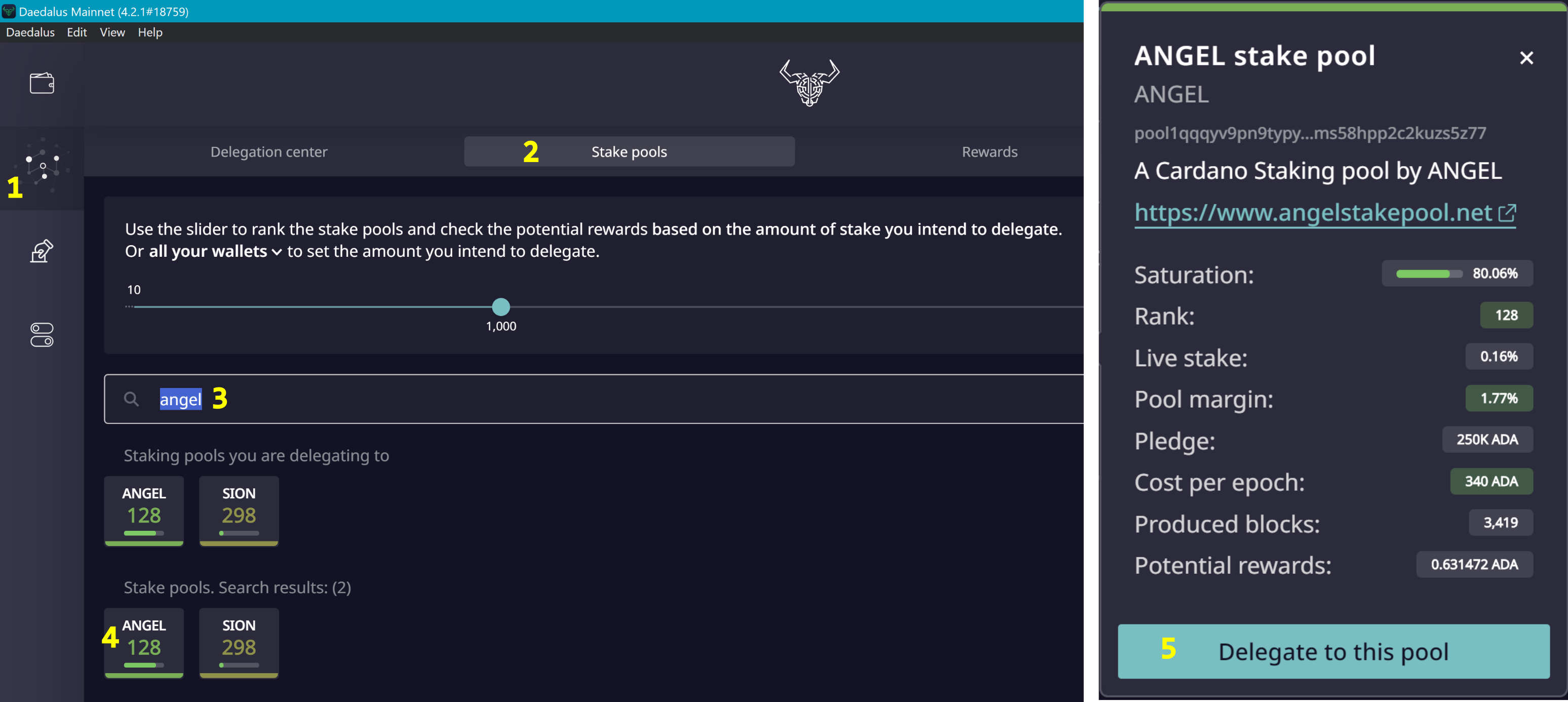
- Click on delegation tab
- Click on Stake pools tab
- Type in ANGEL or SION in the pools search box
- Click on the result and you should get a popup window like the one to the right
- Click on "Delegate to this pool" button and follow the instructions to enter your spending password
- Verify your delegation transaction, and as soon as you see LOW confirmation you are done
- Yoroi delegation -
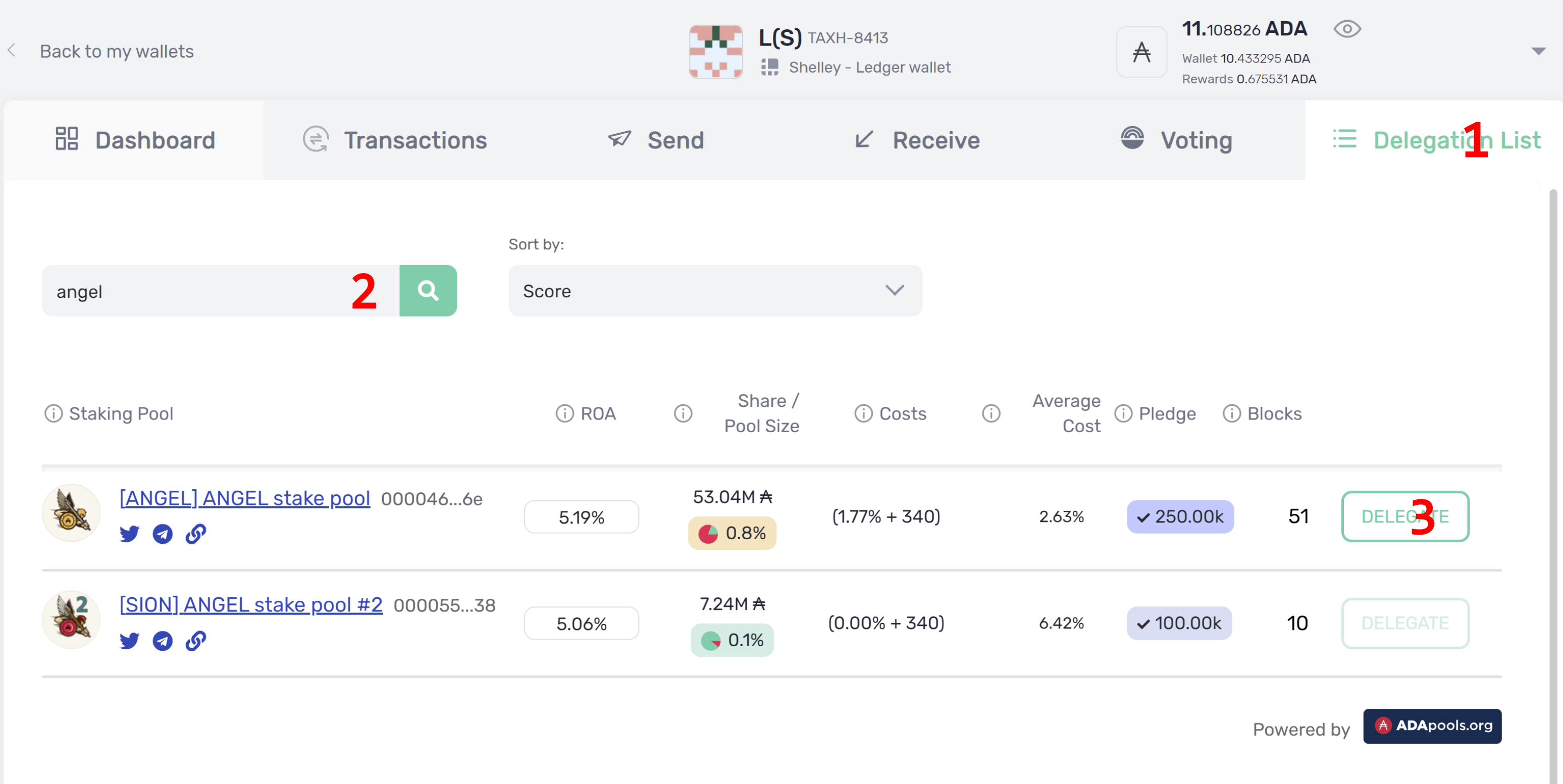
- Select Delegation List in the top right corner
- Enter ANGEL or SION into the search field and click SEARCH
- Make sure you select the right pool and Click on DELEGATE. You then get a popup window that will guide you through the next steps of the delegation process
- Click on Transactions to verify that delegation transaction went through, the status of the transaction should change to LOW (then MEDIUM and last HIGH)
- ETERNL delegation -
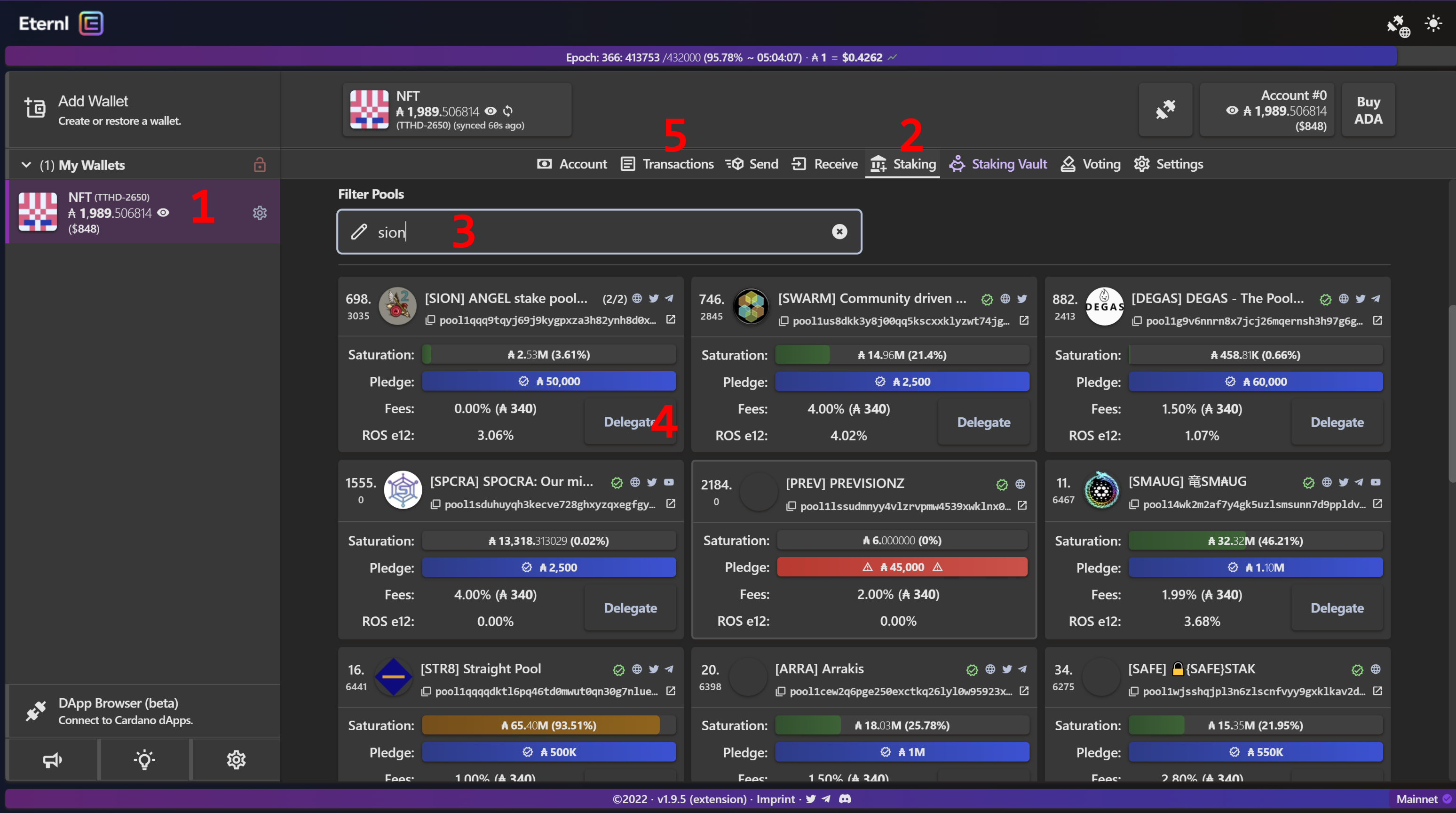
- Click the wallet in the list of wallets
- Click STAKING tab
- Enter ANGEL or SION in Filter pools
- Make sure you select the right pool and Click on DELEGATE.
- Enter the spending password or click SIGN for hardware wallets. Finish the delegation process by completing the steps.
- Click on TRANSACTIONS tab to verify that delegation transaction went through, the status of the transaction should change to LOW (then MEDIUM and last HIGH)
- Note -
The cost of delegation is ~2.18 ADA, 2 ADA the delegation certificate (refundable) and ~0.18 ADA the transaction fee.
Q1. What is Cardano?
Cardano is a decentralized, Proof of Stake (PoS) blockchain-based system based on the Ouroborus algorithm.
It is a smart contract-based system that can be used to run Decentralized Apps (called DApps).
Cardano was designed as a layered system, so it has a settlement layer (CSL) used for ADA exchange and a computing layer (CCL) to runs the
Smart Contracts. Cardano is the first cryptocurrency which runs on a scientific peer review, and it is matematically proven to withstand 51% attacks (only PoS blockchain that offers this level of security, at the same level of Bitcoin).
Q2. What exactly is the Cardano coin ADA?
ADA (₳) is the digital currency of Cardano. It was named after Ada Lovelace, a 19th century mathematician and
daughter of the famous poet Lord Byron. Its primary use is to provide a quick and safe currency exchange and to allow users to operate various Smart Contracts and applications seamlessly.
ADA amount is pre-capped at 45 billions with ~34 billions currently in circulation.
Q3. What is the Cardano roadmap?
IOG (former IOHK), along with Japanese company Emurgo, began developing Cardano in 2015, and its first era, Byron, was released in 2017. The 2nd era, Shelley, was released in July 2020 and it brought full decentralization, which was done in a controlled manner. The 3rd era, Goguen was implemented in late 2021 and was a major milestone because it brought the much needed support for Smart contracts.
Current development is enmarked in Basho era and is related to increase in network scalability. Voltaire will be the last era and will focus its development in on-chain governance, for which current catalyst is a precursor.
Q4. What is a staking pool?
A staking pool is an active (BP or Block Producer) node in Cardano's blockchain.
It secures the network and produces blocks for Cardano's blockchain proportionally to the delegated ADA. This process earns rewards which are
automatically distributed to the delegators by the protocol.
Q5. Why the need for staking pools?
Cardano BP (Block Producer) nodes are randomly chosen to produce blocks for Cardano's blockchain, according to the Ouroborus protocol. These blocks essentially pack all the transactions of the Cardano blockchain for a certain time frame.
At the slot assignment, the BP node must be well-connected and in sync with the blockchain in order to produce and propagate the block.In exchange for the blocks, pools get rewarded, and these rewards are automatically distributed by protocol to delegators accorting to the
delegation/reward cycle.
In summary, Cardano pools guarantee the decentralization, stability and block production of Cardano blockchain.
Q6. Do I need to delegate my ADA to a staking pool?
No. This is not required, but it is HIGHLY recommended if you do not run a full node 24/7.
Delegating your ADA also helps secure the Cardano blockchain, while earning you rewards.
Q7. How to select a pool?
Delegating to pool farms or those pools ran by exchanges IS NOT RECOMMENDED, most of all in the spirit of decentralization, but also because this could lead to unevenly distributed power in the blockchain or open the possibility for bad actors trying to take over Cardano with Sybil attacks. Another very important factor is that the blockchain density would dip badly if a whole pool farm or exchange pools were to go offline (it has happened before with 60 binance pools).
We also have the concept of saturation in Cardano, which is used to prevent centralization [or at least this was the original idea]. Basically, once a pool passes the saturation point (~69M as of sept 2022, with k=500 on mainnet), the returned rewards could be GREATLY diminished, proportionally to the amount of over-saturation.
Q8. What is pledge of Cardano pools?
Pledge (in ADA) is the commitment of the operators/owners to the Cardano pools. It gives an indication of financial resources that operator/owners allocate to the pool(s).
Q9. Why do you have 2 pools: ANGEL and SION?
We have been running ANGEL and SION since the ITN (Incentivized Testnet), as the ITN tickers validation show (can be verified on pooltool.io or cexplorer.io). So, these 2 pools have been functioning on mainnet since day 0
Q10. Do I need to Send ADA to pool in order to get rewards?
No. You should NEVER EVER send your hard-earned ADA to any staking pool.
To earn rewards, you ONLY NEED TO DELEGATE your wallets to your selected staking pools (hopefully ANGEL or SION)
We are including in this section some referral codes related to crypto that might be of our mutual interes
COINTRACKING.INFO
This is an excellent app to manage your crypto portfolio and to be able to take care of your crypto taxes. In that sense, it is extremely flexible, it lets you define different tax methods (FIFO, LIFO, etc), can securely connects to the different exchanges using their API, can export to apps such as TurboTax or TaxAct; and even platforms like Pooltool.io are able to export csv files compatible with cointracking for ADA rewards.
Please, use this referral code https://cointracking.info?ref=E254450 for 10% off in your purchase.
Thank you very much for your support







